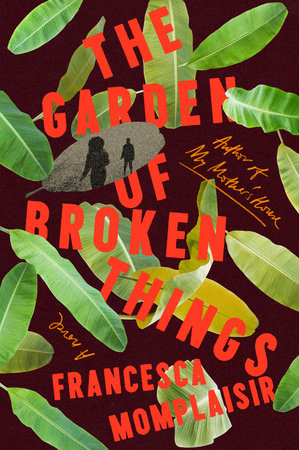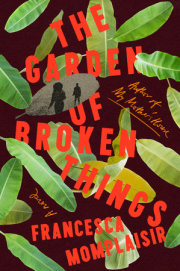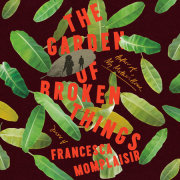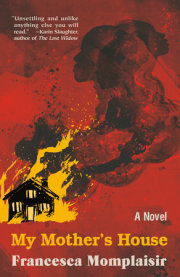1
There must have been a defeated family
torn along an unmendable seam
hoping that all of the damage could be undone
I blast the music to cover the sound of gunshots that fire only in my mind and not into the body of the boy beside me, who seems indifferent to his vulnerability.
Miles doesn’t want to understand why his rebelliousness is not like the revolts of the white boys at his school. He cannot accept that, for them, there is no deadly consequence for minor misbehavior, no cops waiting to scratch the itch of their trigger fingers after first finger-frisking the young boy bodies who stand black, up against the wall before them.
It doesn’t matter that we just got our first Black president. Miles is only safe with the music blaring in our luxury car in this neighborhood with me driving, daring the neighbors to call the law on an unarmed driver and a passenger visiting a delinquent dad at the cul-de-sac of a New Jersey suburb.
I repeat what I’ve been saying for months. “This has to be the last time, Miles.”
“Yes, Mom,” he drawls.
“You could have gotten yourself killed.”
“Fuck, Mom.”
“Are you kidding me?”
He rolls his eyes. “You can curse in front of me. We can listen to songs like this, but I can’t use profanity.”
“We’re not having this discussion again.” This is not the battle I want to fight. Bigger fish, bigger fish.
“We’re not having any discussion.” Miles puts his earphones in.
I yank them out. “I’m talking to you!”
“Just give me room to breathe. Damn . . .”
At least he is responding. Like the car vibrating, answering the bass of Lil Wayne’s “A Milli.”
I place my hand on his and squeeze. He squeezes back. He always squeezes back. No matter what, he always lets me hold his hand.
I open the moonroof and let the lyrics flow out, cussing at the unseasonably cold November air.
A milli, a milli, a mill
A millionaire, I’m a Young Money millionaire
Miles is enjoying the song with me. He doesn’t smile; he doesn’t have to. I know that he loves that we have a love of hip-hop in common. And that I play the explicit versions of songs without embarrassment. I’m not like other mothers, especially not the Ivy League–educated ones with enough degrees to award to our entire family of five: me; Yves, my nine-year-old—sorry, our nine-year-old; Miles, who always says that he’s a parent and the only adult in our household; my mother, Yanique, whom I call “Ma” as do the boys; and my grandmother, whom we all call Ol’Lady. We never count Bright, even when I was married to him. But he is the daddy, my baby-daddy. He hates it when I call him that, so I do, every chance I get.
I keep my hand on Miles’s as we pull up to Bright’s new McMansion in Bergen County, New Jersey. I park in front of the driveway (not in it), facing in the opposite direction of the other cars. There aren’t usually cars parked on the streets. All of the houses have multicar garages. But it’s the day after Thanksgiving, so the neighbors have had overnight guests. A bigger audience for me. I close the moonroof to keep Miles warm.
Before I step out of the car, I change out of my sneakers and into my Manolo stilettos. Bright is already outside in his driveway, arms crossed, armed to the teeth, angry armor on. I can’t wait. I’m on the offensive, as always. Before he can start his rant, I go in.
“Loosen up, Bright. Unfold your arms. Stop being so pretentious. Living in the Jersey burbs doesn’t make you white.” I’ve come prepared for the biweekly entertaining argument. Today will be worse because of what Miles did last weekend.
“Go to hell, Genevieve!”
“I wouldn’t want to crowd your space!” He’s already weakened, off his game. My loud, explicit hip-hop, with all of the profanity and the N-word, always throws him off-balance. I focus on the contortion of his furrowed brows. He always takes the bait, enjoying the angry exchanges almost as much as I do. Well, not quite as much, because he’s usually on the losing side.
“Just because I have some sense of decorum . . .” He’s huffing now. “Blasting your music from your ‘Range’ doesn’t make you ‘Jenny from da Block.’ ” He raises his voice over the bass thump of my modest SUV. No crazy rims, no dark tinted windows, a subdued burgundy instead of shiny black or bright white.
“ ‘Jenny from da Block’? That’s so old, Bradley. You can do better than that.”
“And you can do better than roll up here like some hood-rat—”
“What? I didn’t catch that!” I cup my hand over my ear and lean in as if I’m straining to hear him over the music still playing in the car. Lil Wayne’s words are muffled, but I’m bopping my head to the beat. I mouth the lyrics.
Bright looks like he’s about to cry or slap me. He never does either. He never has. I pretend not to hear him say: “My neighbors and I thank you, once again, for the lesson in ghetto-fab. And, I’ll remind you, once again, that this is the sort of behavior that has Miles acting out.”
“And, once again, I’ll remind you that . . .” I take a deep breath and speak through my teeth to keep from yelling. Composed, I enunciate, “Lil Wayne did not abandon your sons.”
I stop for a moment and take stock of the house. Six bedrooms, Miles told me. I have never stepped foot inside. It’s the house we should have built together, the house that Bright now wants my boys to live in with him. That is always the threat—to take the boys from me. I think but don’t say out loud this time, I wish a muthafucka would try!
The music sounds louder as Miles gets out of the car. I see him out of the corner of my eye but I can’t stop arguing with Bright. Before Miles can even slam the car door shut, he turns around and gets right back in.
I know that he will write about this incident later. In a rhyme or a song. There might be a sketch. I convince myself that he doesn’t know that I go through his notebooks when he’s at school. He composes more than he draws. I am never in his pictures. Only Yves, mostly Yves. And a man in profile or with his back turned, walking or running.
“That’s on you, Bright.” I throw a nod over my shoulder.
“Isn’t it always my fault?”
“I see that you still haven’t tried therapy.”
“Just because you’re a psychiatrist doesn’t mean everybody needs therapy, Genevieve. When all you have is a hammer—”
“I have more than a hammer. I have a tire iron, a baseball bat, a hunting knife. And that’s just what’s in the car.” I always refine my words beforehand, well-forged instruments, sharp and blunt, wielded to injure. I use them on Bright to keep from turning them on myself. I know me. I’ve done a million times what a doctor is never supposed to do—self-diagnose and psychoanalyze members of her own family. I know that attacking Bright keeps me from hurting myself. Not slit-your-wrists type of hurt. The negative self-talk stuff that sends me into the darkness. But the prophylactic of hurting Bright, this backward self-protection, never lasts. Neither does my poise.
I imitate Bright and stand with my arms folded. I look him up and down, formulating my next injurious barb.
“You have got to stop this, Genevieve.”
“Stop what? Stop reminding you how you fucked up? I don’t have to say anything about that. Your sons don’t even want to see you. I had to force Miles to come here.”
“The same way you’re forcing him to take a vacation to Haiti?”
“You know damn well it isn’t a vacation. We agreed on this, Bright. You asked for this.”
“I said we should send him to my mom down south.”
“To hang out with your thug nephews and end up dead or in jail anyway? Isn’t that what we’re trying to prevent?”
“Thugs? But you can come over here all ghetto . . . You always let him do whatever he wants.”
“He doesn’t want to go to Haiti. I am making him go. He needs to see what life is like for so many kids. What it could have been like for him or me, for that matter.” I cringe as I say the words I’ve heard most of my life. The voices of my mother’s and grandmother’s friends scolding their children, threatening to send them to Haiti for good if they didn’t straighten up, ring in my ears. I never imagined that I would be one of them. I never imagined so many things—marriage, divorce, motherhood, single motherhood, and now taking my first-born son to Haiti because the boy has been getting into trouble.
“You’re taking him to the Caribbean!” Bright senses that I’m weakening.
I am, but I will never tell Bright that I am taking Miles to Haiti so I can be alone with my son, so I can get to know him. This is not punishment; it is a rescue. I need to get him away from here, if just for a week, away from this place, so he can breathe because he is away from danger. For a brief reprieve from my worry, and to love him without the interruption of the constant fear that he might be taken from me violently.
Bright insists, “At least in North Carolina he could visit some colleges, see a good example.”
“You are supposed to be the good example. The man he should want to grow up to be.”
“Not this again. . . . You could let them come live with me.” Bright turns his head just in time to see his girlfriend’s face in the upstairs window.
I see it too. “Time to change baby’s diaper,” I chuckle. “That’s why your sons don’t want to see you. I couldn’t even drag Yves here!”
I can only suppress my anger in short stints. I push my pain down into my abdomen. I’m like a shaken soda bottle. I know that the cork will eventually pop off; the foamy liquid will explode and spill into a mess that cannot be put back in. But I try. I try so hard. I need to keep it all contained in these moments; otherwise, I’ll start crying. Then fucking Bright will see me dripping all over myself. He’ll relish the sloppy leak. So, instead of allowing my wounded self to rise into my throat, to breach the barrier of my eyelids and lips, I stamp it down into my stomach and let rise the toxicity of my venomous wit to taunt Bright into overflowing.
I am trying to hold myself together. But the flutter of the curtains, the gauzy image of a younger woman, threatens to knock me over and splatter me all over the driveway. I can’t help but imagine him with this new woman or some other. I couldn’t see it all those years ago, when I suspected but refused to admit inside myself what he was doing. My hurt and jealousy drive me to this sort of low-brow pettiness every time I see him except when . . . When we meet up to touch each other again, to pretend it’s still early on in our relationship, when we were young and greedy for each other. I need to believe that he couldn’t have, still can’t be like that with, anyone else. But, standing here watching the blinds fold shut, I can see it all.
I’ve never met this new girlfriend. All I know is what little I see through the sheers on these trips to drop off the boys. Mostly Miles. Yves never wants to go. He doesn’t know Bright. Bright was gone before Yves was born. It hurts to talk about that part, even to myself. I focus on the girlfriend.
Miles told me that she looks like me, but shorter. In my mind I make up the rest. Mini-me, five feet two, rounder, less attractive, a little bit younger. Most likely, she has a weave. Bright must hate that. Gotta be careful not to snatch out that horsetail while doing it from behind. That’s what I used to enjoy most. What I still enjoy. Him pulling my hair while taking me, gathering my ponytail into his fist, yanking my head far back enough to kiss me.
I can’t stand this any longer. I turn around and start to walk away. I feel the long locks I’ve been growing since before Yves was born sway in rhythm with the sound of my three-and-a-half-inch heels. I can feel Bright’s eyes on my ass. I switch my hips just a little more to make sure he knows that I know he’s looking. I look good, at least ten years younger than forty-five. I walk steadily, flaunting the length of my legs in skinny jeans. I pretend that I’m not cold in my cropped leather jacket. I need him to see that I am still on my game, even knowing that he has someone, yet another one after the other ones. I want him to look at how balanced I am in the shoes I buy especially for these occasions.
I stopped wearing heels as soon as we started dating, to preserve his ego. He’s tall enough, a respectable five feet ten. But damn, what he lacks in height, he more than makes up for in looks. He is fine. Really fine. I am tall for a woman, instantly taller than him in anything but ballet flats. In pumps, I can practically drink soup from the top of his head, as the Kreyòl saying goes.
Head held high, I turn around and wave with my hand to acknowledge the blurred figure in the window. I make a tight little gesture approximating a good-bye before flipping Bright off. I laugh at how trifling I can be. I recognize the look on his face. I need him to hate me for a moment, knowing that his disdain will give way to lust, then love. And my favorite expression—regret. No matter how viciously we argue, his eyes always dissolve into remorse for what he did to wreck our marriage. I pucker my lips in a tight kiss, just for fun. He is shamelessly panting for a piece, a nice hot slice of what he is watching walk down his driveway. He is probably hard too. I am ashamed to say that, despite how wounded I am, I feel desire every time I see him.
Copyright © 2022 by Francesca Momplaisir. All rights reserved. No part of this excerpt may be reproduced or reprinted without permission in writing from the publisher.











